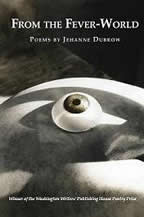
|
From the Fever-World To fully appreciate the poems of Jehanne Dubrow's From the Fever-World, the reader must suspend rational belief, if only for a moment. The premise of Dubrow's second full-length collection--that these are the long-lost lyrics of an imaginary Yiddish poet from the early 20th century, a woman who lives in the equally fictitious city of Always Winter, Poland--is nothing less than fantastic, and the book is all the better for it. The poems exhibit tremendous craftsmanship. Yet, one of their few flaws--and perhaps the greatest element of the book that necessitates the momentary suspension of belief--resides in the kind of poem that Dubrow's Ida Lewin writes, a suspiciously modern lyric more in tune with the poetry of the early 21st rather than the early 20th century. Thus, verisimilitude seems, at best, off-center, and, at worst, problematic. However, if those facts are what hold you back from loving this book, I doubt it would bother Dubrow or fans of her work. Imagination and rational belief aren't always likely bedfellows, or even good ones for that matter. And Ida Lewin expresses a fiercely feminine viewpoint, one both concerned with and critical of the place of women in a culture and time that hardly seems to think about them at all. Along the way (and make no mistake, this book is a journey, complete with a map sketched by the author), Lewin's lyrics contemplate the pleasures and betrayals of the body, the curious idiosyncrasies of an ancient and mystifying place, and all the while exhibit a unique sense of humor, sometimes tart, and sometimes flat-out bold in nature. Throughout the book, Lewin isn't afraid to admit her homeland's faults: Not every woman needs Implicit here is, not only the fact that the speaker of the poem contests the surrounding culture's environment and practices, but also its very definition of the female identity as a symbol of tenderness and maternal care submissive to whims of cultural tradition. I cursed my body Ultimately, as the book nears its conclusion, Lewin's complaints give way to something else: I should have known Why wish for ice The question, of course, isn’t entirely rhetorical. It’s meant to be mulled over and debated. And, like Dubrow’s Lewin herself, the answer resides somewhere between acceptance and resignation. --Jay Robinson
|
